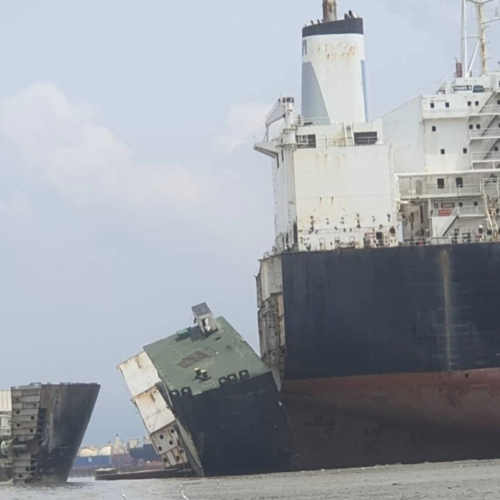Press Release – Container shipping asked to clean up its act in view of upcoming scrapping wave
Triggered by overcapacity, lower freight rates and the new carbon regulations expected this year, numerous container ships will be sold for scrapping in the near future. In light of this foreseeable surge in the number of discarded box ships, the NGO Shipbreaking Platform has reached out to the largest companies of the sector demanding change in corporate policies and practices by encouraging the pursuit of sustainable solutions.
Several container shipping companies have already been in the spotlight due to the poor management of their end-of-life vessels. NGOs and Danish media revealed the hypocrisy of Maersk when they decided in 2016 to U-turn on their recycling policy and head for the Indian beaches. The profits made by Swiss giant MSC on the back of exploited workers and coastal environments also caused public outcry, and, in 2018, Scandinavian pension funds, including the Norwegian Government Pension Fund Global, divested from Taiwanese container line Evergreen due to the breach of international human rights and the severe environmental damage caused by the beaching of their vessels.
Ships contain many hazardous substances and materials that may negatively affect people and the environment. Hence, it is crucial that their dismantling is carried out in an environmentally sound and safe manner at a recycling destination that can safeguard workers’ health and protect local communities and ecosystems from pollution. Progressive companies and recycling businesses are looking at the EU Ship Recycling Regulation as the only responsible standard regulating this industry. South Asian beaching yards fail to comply with this standard, and more recently two Turkish facilities were removed from the EU List of approved ship recycling facilities.
With increasing focus on sustainability and due diligence, including pressure from investors and clients, many container lines need to revise their ship recycling practices and policies. Beaching is by far the worst industrial practice, as is the practice of down-cycling and re-rolling contaminated scrap steel. Options that operate with standards on safety, circularity and material recovery in line with international labour and environmental law and ESG expectations already exist. With the projected growth in demand for capacity to recycle large vessels, the NGOs call on the box ship sector to show leadership and support the scaling of truly sustainable ship recycling solutions.
Related news

Press Release – Marinakis’ tanker beached in Bangladesh amid Greek government indifference
A recent Reporters United’s investigation unveils the illegal end-of-life sale of TRADER III — a tanker linked to Greek magnate Vangelis Marinakis and cash buyer GMS.
... Read More
Platform News – REMINDER: Ship Recycling Lab on 20-21 September in Rotterdam
The NGO Shipbreaking Platform invites you to attend the conference Ship Recycling Lab on 20-21 September in Rotterdam (Netherlands).
... Read More
Press Release – Platform publishes list of ships dismantled worldwide in 2018
744 large ocean-going commercial vessels were sold to the scrap yards in 2018. Of these vessels, 518 were broken down on tidal mudflats in South Asia.
... Read More
Press Release – Danish opposition parties call on Government to stop beaching of Maersk vessels
The Danish Environment Minister, Esben Lunde Larsen, had to answer to the Parliament yesterday following questions put to the Government by all the opposition parties. The… Read More

Platform News – NGO Shipbreaking Platform awarded grant by Royal Academy of Engineering and Lloyd’s Register Foundation
Engineering X has awarded nearly £1 million in grants to projects aimed at tackling challenges of decommissioning ships and offshore structures.
... Read More
Press Release – Worst corporate dumpers asked to clean up their acts
Targeting sustainability and fleet managers, the NGO Shipbreaking Platform calls for the adoption of responsible ship recycling policies in letters sent to shipping companies standing out for… Read More


